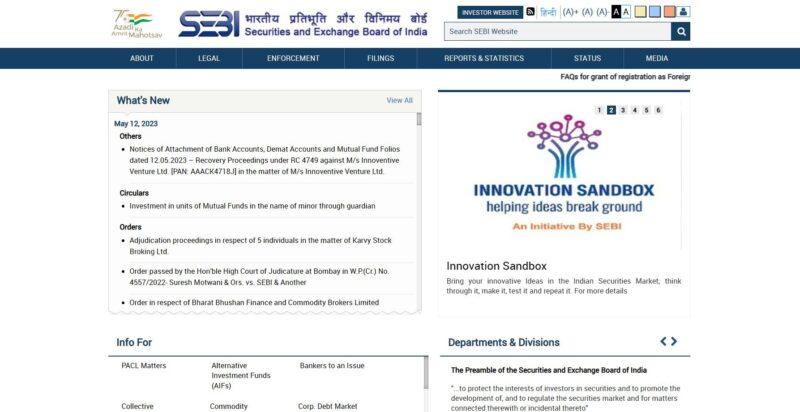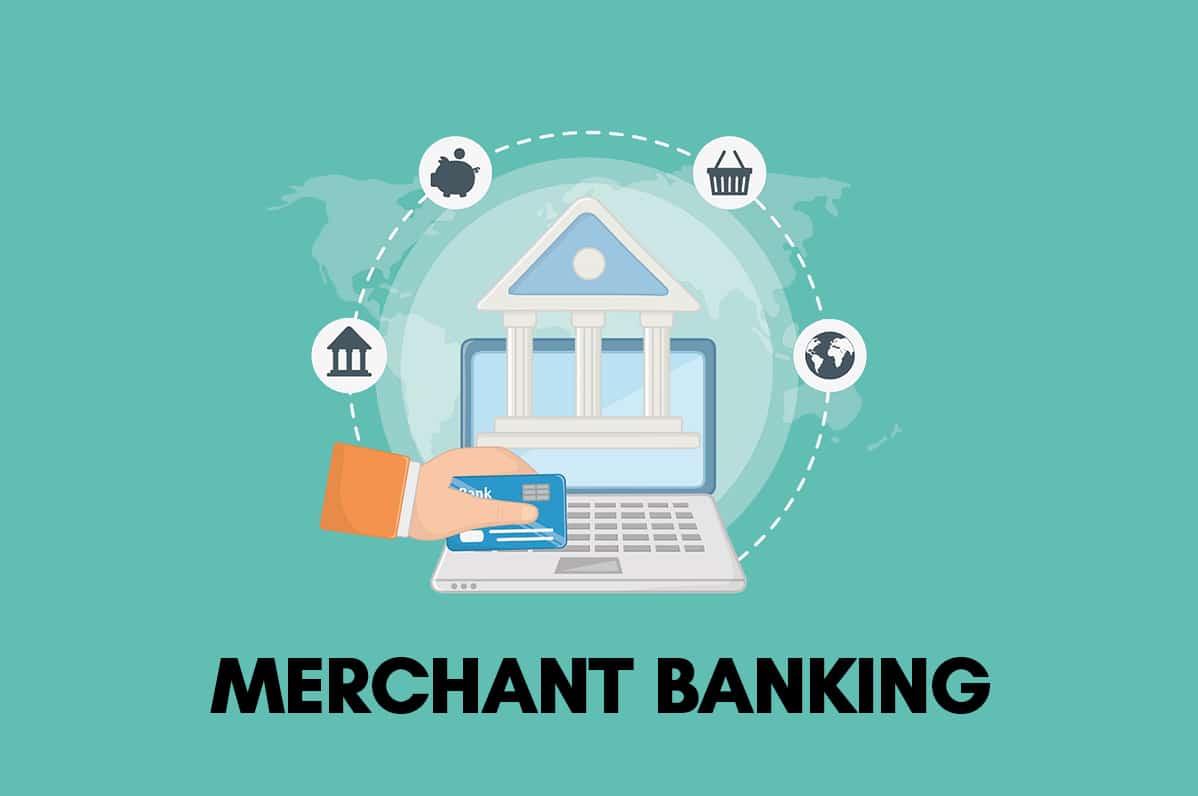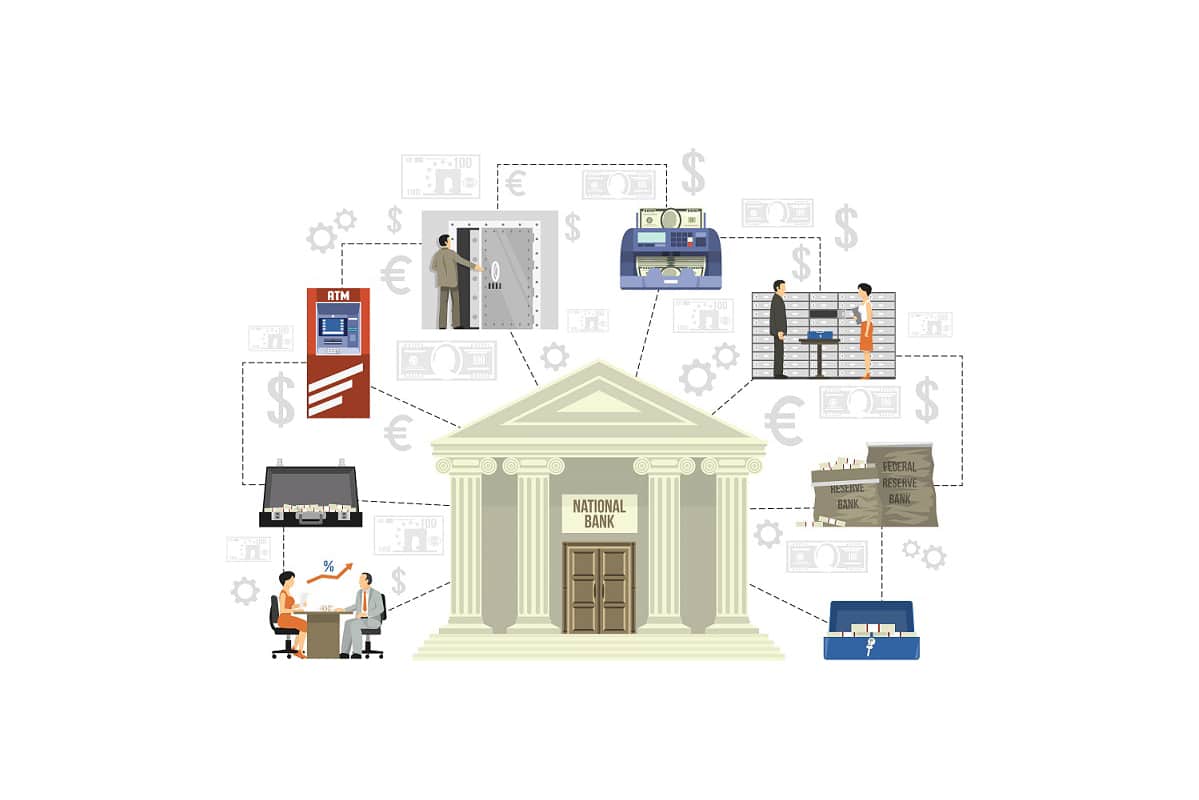Merchant banking provides financial and advisory services to corporate clients. Though it was introduced in the 1960s, the sector witnessed significant growth and development in the 1990s. Today, merchant banking is an integral part of the Indian economy and is important for facilitating corporate finance and capital market transactions. This article will provide an overview of merchant banking in India, its objectives and functions.
What is Merchant Banking in India?
It is an institution that primarily offers consultancy to its customers regarding financial, managerial, marketing, and legal concerns. They usually offer assistance to business loans for big companies, international finance, and underwriting. These banks are specialists in trading with multinational companies.
Merchant banks render numerous financial services, advice, consultation, management, counseling, and solutions to big corporate houses. They help a businessperson to commence a business and raising finance. Furthermore, they help them to expand, modernizing, and restructuring the business. They also grant support in registering, buying, and selling shares at the stock exchange.
They are pretty different from normal commercial banks in several ways. For example, commercial banks generally accept deposits and give loans, but merchant banks only offer consultation and management for a certain charge. They only accept deposits and offer loans only to a few clients and not to the general public.
The word merchant banking has a different meaning in different countries. In the U.S. merchant, bankers are called “Investment Banks,” in the U.K., they are called “accepting and issuing houses.”
Who is a Merchant Banker?
In India, a merchant banker is defined as an individual who is who is involved in the business of issue management either by making arrangements regarding buying, selling or subscribing to the securities as a manager, advisor, consultant in relation to such an issue management. The industrial boom in India has led to major growth in the need for merchant bankers. They provide an amalgam of banking and consultancy services.
Objectives of Merchant Banks

Merchant banking in India was started in India keeping in mind the following objectives:
- Primary objective is to assist companies with raising funds by offering standby credit services.
- Merchant banks provide credit solutions to both institutional and corporate clients.
- Merchant banks provide financial support to small businesses, including startup loans and assistance in raising funds through stock exchange and other means.
- Underwriting is a form of financial insurance offered by banks to their clients, ensuring payment in case of any damage or loss.
- Banks manage their clients’ portfolios by monitoring their assets, credits, and debits to avoid losses. They also offer services related to asset liquidation and income tracking.
- Corporate advisory services are provided to assist both new and expanding companies with financial aid and guidance to ensure success and prevent issues.
- Banks help manage corporate issues such as securities and serve as intermediaries in capital transfers.
- These banks establish secondary markets where bills can be exchanged or traded, with merchant banks acting as the central accepting house.
- Lastly, merchant banks offer services related to buying and selling financial instruments as a dealer.
Features of Merchant Banking
Here are some of the must-know features of merchant banking in India-
- These financial institutions cater to large businesses and wealthy individuals rather than the general population.
- Services are provided that are more tailored to individual needs than those offered by banks or other financial institutions.
- A significant percentage of the staff are decision makers.
- Decisions are made quickly.
- There is a high volume of information and database available.
- The organization has frequent and intense interactions with its environment.
- Extensive range of connections that can be utilized to assist customers in acquiring appropriate funding and investment.
- The organizational structure is flexible.
- The focus is on short and medium-term projects.
- There is an emphasis on generating income through fees and commissions.
- Interest rates and fees that are more competitive than those of other institutions.
- Operations are innovative rather than repetitive.
- The organization provides sophisticated services both in domestic and international domains.
- The profits are distributed at a low rate.
- The liquidity ratio is high.
Also Read: List of Banks in India
Functions of Merchant Bankers

There are a lot of functions that merchant banks do; let’s have a look at some of them:
1. Help raise funds: Merchant banks specialize in helping their clients raise funds from both domestic and international markets by issuing shares, equities, debentures, and bank loans. Thus, they help in obtaining short- and long-term credit.
2. Revival of sick units: They support companies in reviving disabled manufacturing units by working with long-term financial institutions and the Industrial and Financial Restoration Council.
3. Handling government permission: This type of banks assist clients in obtaining government permissions for commencing new projects, as well as expanding and modernizing existing ones.
4. Advice on various issues: In India, merchant banks offer advice to clients on modernization and expansion of their businesses, in addition to providing financial services.
5. Brokers in the stock exchange: Merchant banks act as brokers in the stock exchange for clients, buying and selling shares on their behalf.
6. Promotional Activities: They also act as industrial business promoters, assisting developers with feasibility studies, defining ventures, and obtaining necessary permits.
7. Services to private sector units: These banks offer services to public sector units, including help with obtaining long-term capital, foreign collaboration, marketing of securities, and managing long-term finance.
8. Management of interest and dividend: Merchant banks provide guidance to clients on managing dividends on shares and interest on debentures, including advice on the timing and rate of dividends.
9. Money Market operation: They engage in money market operations, trading with short-term money market instruments such as government bonds, commercial paper issued by large corporations, and treasury bills issued by the RBI.
10. Managing Portfolio of Clients: Merchant banks offer services related to portfolio management for both institutional and other types of investors, aiming to optimize the value of their investments by effectively managing securities.
11. Assistance to small companies: Merchant bankers provide support to their clients throughout the entire project lifecycle – generating ideas, creating reports, preparing and reviewing budgets, and securing financing. This level of assistance is particularly beneficial for new entrepreneurs who may require additional guidance and expertise.
12. Leasing services: Clients can lease assets and equipment from the banks that can be used to generate rental income.
13. Managing Public issue of companies: Wealthy individuals often hire merchant banks to offer stocks, preferred stocks, and bonds to the public.
14. Underwriting: Banks also engage in equity underwriting by evaluating the price and risks associated with specific securities, and by initiating the process of publicly issuing and distributing stocks.
15. Corporate Counseling: Merchant banks provide corporate counseling services that are essential for all types of industrial units, regardless of whether they are new or established. These services cover a broad spectrum of areas, including project counseling, project management, capital restructuring, working capital management, public issue management, loan syndications, fixed deposits, and lease financing.
Services of Merchant Banking

1. Investment Banking: Merchant banks offer financial services and advice to both businesses and individuals, including underwriting new securities, facilitating mergers and acquisitions, and providing equity capital to companies.
2. Corporate Finance: Merchant banks assist companies in raising funds for growth, expansion, and other activities by arranging debt or equity financing, providing financial advice on mergers and acquisitions, and other relevant services.
3. Private Banking: Merchant banks provide private banking solutions that cater to managing personal wealth, investment portfolios, estate planning, and tax planning.
4. Trade Finance: Merchant banks offer trade finance services that involve issuing letters of credit, arranging letters of guarantee, and providing foreign exchange services.
5. Asset Management: Merchant banks offer asset management services that include portfolio management and investment advice.
6. Cash Management: Merchant banks provide cash management solutions that involve managing cash flow and offering advice on liquidity issues.
7. Advisory Services: Merchant banks also offer advisory services such as guiding businesses in developing strategies and managing risk.
8. Project counseling: It involves several tasks, such as creating project reports, determining the financing method to cover project expenses, and evaluating the project report with financial institutions and banks. This process also involves completing application forms with relevant details to secure funds from financial institutions and obtaining approval from the government.
9. Restructuring strategies: Merchant bankers play a crucial role in supporting client companies with the restructuring of their operations, which may include mergers, acquisitions, and takeovers. They serve as intermediaries to facilitate negotiations between the parties involved. Additionally, they work closely with the client’s management to ensure successful outcomes.
Also Read: List of Private Banks in India
The aforementioned services offered by merchant bankers are from some of the specific sectors. Some of the general service provided by them throughout the world are:
- Merger and acquisitions
- Management and guidance on corporate financial matters
- Financing and administration of projects
- Promotion and underwriting of new issues
- Oversight of customer security measures
- Management of investment portfolios
- Banking services for investments
- Advisory and support for trade financing
- Raising and advising on venture capital
- Supervision and management of assets
- Foreign Currency Financing
- Consultancy to Sick Industrial Units
- Act as Debenture Trustee
History of Merchant Banking
| YEAR | STARTED BY WHOM? | FACTS |
| 17th and 18th Centuries | Grain Merchants of France and Italy | Initially, a few merchant bankers were involved who acted as intermediaries in financing their own or other transactions. |
| Late 18th Century | London | Merchants began to finance foreign trade by acceptance of the bill. With time they started using other services such as underwriting the issues, loan syndication, portfolio management, etc. |
| 1967 | National Grindlays | This was the introduction of merchant banking in India. |
| 1970 | Citi Bank | – |
| 1972 | State bank of India | It was the first commercial bank to set up a distinct division for merchant banking. |
| 1973 | ICICI Bank | 1. FERA came into existence that helped increase merchant banking activities in India.
2. Other banks also started these services such as PNB, Bank of India, UCO Bank, etc. |
Also Read: Banking System in India Explained
Reasons for growth of Merchant Banking
There are a few reasons that accelerated the growth of these banks in India. Some of the reasons are:
1. Influx of new financial supporters: The Indian economy is seeing the influx of portfolio speculators and foreign direct investors, leading to an expansion in the role of merchant bankers.
2. Disinvestment in the public sector: It enables merchant banks to become more specialized in their services.
3. Introduction of new currencies: Influx of new currencies into the market is providing merchant banks with increased autonomy.
4. Globalization: Following the 1991 reforms, foreign companies were allowed to invest in the Indian economy, leading to an influx of funds from abroad and the growth of merchant banks.
5. Rise in Competition: Globalization created a more competitive market environment, which spurred the expansion of the Indian corporate sector. Merchant bankers responded by providing specialized services to corporations.
6. Switch in consumer trends: With the arrival of foreign players in the market and increasing competition, there was a significant shift in manufacturing and corporate sectors, resulting in better quality products for Indian consumers. This, in turn, led to increased prominence of financial products and instruments.
7. Government Reforms: The Indian government reduced its intervention in the economy, increased privatization, and raised investment limits. These measures decreased direct interventions and encouraged more foreign players to invest in the country.
These were some of the causes that hastened the increase of Merchant Banking in India. Let us also know the services that merchant banking offers to corporate and big business houses.
Merchant Bankers in India and Types of Organization They Belong to
There are approximately 200 merchant bankers in India. Below are some popular banks and financial companies that provide Merchant banking services in India, classified on the basis of the type of organization they belong to:
1. Public Commercial Banks and their sub-banks
- State Bank of Bikaner and Jaipur
- Karur Vysya Bank
- SBI Capital markets Ltd.
- Punjab National Bank
- Bank of Maharashtra
2. Private Commercial Banks
- Yes Bank Ltd.
- ICICI Bank Ltd.
- Axis Bank Ltd.
- Tata Capital Markets Ltd.
- Reliance Securities Ltd.
- Bajaj Capital Ltd.
- ICICI Securities Ltd.
3. Foreign Banks
- Citi Bank
- National Grindlays bank
- Hong Kong Bank
- Barclays Bank Plc
- Deutsche Bank
- FedEx Securities Ltd.
- Goldman Sachs (India) Securities Pvt. Ltd.
- Deutsche Equities India Private Limited
- Morgan Stanley India Company Pvt. Ltd.
- Citigroup Global Markets India Pvt. Ltd.
- Barclays Securities (India) Pvt. Ltd.
4. State Level Financial Institutions
- State Industrial Development Corporations (SIDC’s)
- State Financial Corporations
5. All India Financial Institutions and Development Banks
- IFCI
- IDBI
6. Private Financial Consultancy Firms and Brokers
- J.M. Financial and Investment Services Ltd.
- Enam Financial Consultants
- Ceat Financial Services
- DSP Financial Consultants
- Kotak Mahindra
7. Professional Merchant Banking Houses
- A.K. Capital Services Ltd.
- Almondz Financial Services Limited
- Batlivala And Karani Securities India Private Limited
- Gretex Corporate Services Limited
- IIFL Securities Limited
8. Technical Consultancy Organizations
- Tata Consultancy Services
- L&T Technology Services
- HCLTech
- Infosys
- Wipro
- Tech Mahindra
Also Read: List of Scheduled Banks in India
Regulations for Merchant Banking in India

SEBI was established in 1992 as a regulatory body for protecting the interests of investors in the securities market. They made a few rules and guidelines for merchant bankers to eliminate monopoly and protect interests of the customers. It is called Securities Exchange Board of India (SEBI) Regulations, 1992, and are amended regularly as per the dynamic market conditions. These have been classified into five chapters and four schedules:
- In the first chapter of the document, various terms that are commonly used in merchant banking are defined and explained.
- The second chapter focuses on the process of registration and certification of merchant bankers in India. It also outlines the operational capabilities and capital requirements that must be met in order to become a registered merchant banker.
- The third chapter covers the general obligations and responsibilities that a merchant banker must undertake, including adhering to a code of conduct, disclosing information, conducting audits, and following other important operating guidelines.
- Chapter four discusses the Board’s authority to investigate merchant bankers and the consequences that may result from their findings.
- Chapter five addresses cases of defaults and the measures that will be taken if guidelines are not followed or any wrongdoing occurs.
The schedule by SEBI also comprises of the format of substantial forms and reports and states the fees that are required to be paid for different purposes. One of the most important things to remember is that no organization would be able to become a merchant banker until and unless they get a certificate of registration from SEBI. Plus, he must get himself registered under these regulations if they want to persevere any of the merchant banker activities.
The Reserve Bank of India is another regulatory authority that oversees financial institutions. The Foreign Exchange Management (International Financial Services Centre) Regulations, 2015 apply to merchant banks falling under Section 2 clause (b) explanation. Banks engaged in merchant banking activities must comply with the prudential exposure norms and statutory limits outlined in Section 19(2) & (3) of the Banking Regulation Act, 1949, as prescribed by RBI.
For getting the certificate of registration, you would have to apply by filling the form and completing two sets of norms:
1. Operational capabilities: As per operational capabilities, merchant bankers are divided as per their roles.
2. Capital Adequacy Norms: For registration of the different categories of a merchant banker, SEBI has laid a few norms. Capital adequacy is calculated by taking capital contributed to the business plus free reserves. We will see them in the next section.
How to Become Merchant Banker in India?
- To become a merchant banker, the applicant needs to pay a fee of Rs. 50,000 by demand draft drawn in favor of SEBI, payable at Mumbai, and this fee is non-refundable.
- A merchant banker needs to hold a valid SEBI registration as per the SEBI regulations 1992. Then only he becomes eligible for acting as a Book Running Lead Manager (BRLM) to an issue.
- After this, the issuer company asks the SEBI-registered merchant banker to make the offer document.
- Merchant banker needs to ensure that he adheres to the legal compliance while preparing the offer document.
Fees
- As per SEBI Amendment Regulations, each merchant banker would have to pay a registration fee of Rs. 5 lakhs for getting a certificate from the Board. They would have to pay the fee within 15 days of receiving notice from the court.
- Renewal fees of Rs. 2.5 lakhs have to be paid by a merchant banker to continue the registration. Registration should be renewed every three years starting from the fourth year after the initial registration date.
- The applicant’s net worth must be at least Rs. 5 crores.
Classification of Merchant Bankers
Below is the outline of four categories for registration of merchant bankers and the capital adequacy norms by SEBI:
| CATEGORY OF MERCHANT BANKER | MINIMUM NET WORTH | ROLES |
| Category 1 | Rs. 5 crores | Bankers in this category act as a consultant, advisor, issue manager, portfolio manager, and underwriter. |
| Category 2 | Rs. 50 lakhs | They act as a consultant, advisor, portfolio manager, and underwriter. They cannot be an issue manager of their own but can act as co-manager. |
| Category 3 | Rs. 20 lakhs | Neither can they do activities related to portfolio management, nor take issue management of their own nor act as a co-manager. They can act as a consultant, advisor, and underwriter. |
| Category 4 | Nil | They can act only as a consultant or advisor to an issue of capital. |
What should you Remember while Choosing a Merchant Banker

Here are a few points that you should review before choosing a merchant banker-
- Can emphasize the company’s sector of operation.
- Has immense knowledge and demonstrates dedication and proficiency in conducting research.
- Builds and maintains positive relationships with investors. Also, ability to search and form contacts is required.
- Has a history of successful accomplishments.
- Can facilitate market-building arrangements.
- Competence to examine and determine.
- Inbuilt behavioral skills like creative approach, honesty, transparency, helpfulness and friendliness.
- A positive attitude towards problem-solving.
Merchant Bank vs. Commercial Bank
It is important to understand the difference between the two banks for understanding the roles and functions of merchant banks:
| BASIS OF DIFFERENCE | MERCHANT BANK | COMMERCIAL BANK |
| 1. Clientele | Work primarily for corporate firms. | Cater to the needs of individual customers. |
| 2. Attitude towards risk | Always open to take risks. | Risk averse. |
| 3. Ability to open accounts | Everyone cannot open an account. | Open for everyone to open accounts. |
| 4. Orientation | Management-oriented. | Asset-oriented. |
| 5. Type of assets | Usually do business with equities. | Usually buy and sell debt-related finance such as loan approvals, credit proposals, etc. |
| 6. Roles and functions | Underwriting, portfolio management, consultant, and advisor. | Mostly play the role of financers only. |
| 7. Type of associated market | Related to the primary market. | Related to secondary market. |
Also Read: List of Commercial Banks in India
Difference between Merchant banking and Investment banking
A lot of people get confused between Merchant and Investment banking. Take a look at the table below to better understand their roles and interests-
| BASIS OF DIFFERENCE | MERCHANT BANK | INVESTMENT BANKS |
| 1. Clientele | Medium-sized organizations. | Large and established companies. |
| 2. Objective | International financing activities. | Underwriting and issuance of securities. |
| 3. Roles and functions | Trading finance, real estate investment, and corporate investment. | Helps in obtaining long-term capital requirement for customers by becoming a mediator between the investors and the organization. |
| 4. Facility of Trading | Offer trade facilities to their clients. | Very less banks offer trade financing facilities. |
| 5. Type of asset dependency | Both fee and fund based as it offers custodial, banking, and advisory service to its customers. | Only fee based as it earns money from services offered, lease rentals, and interest. |
Over the years, merchant banking has played a critical role in shaping the economy of the country, especially the corporate industry. It provides a range of financial services to their clients. With the speculation about the growth of the Indian economy in the coming years, merchant banking is expected to impact the country’s business and economic sectors.
Source: SEBI – Merchant Bankers




